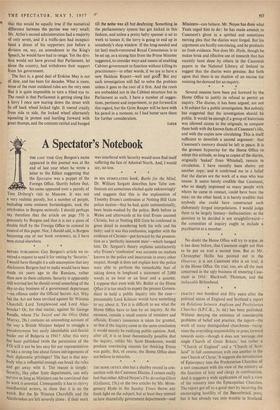BEFORE PUBLISHING Guy Burgess's article we re- ceived a request
to send it for vetting by 'Security.' I would have thought it a safe assumption that any disclosures Burgess had to make would have been made six years ago to the Russians, rather than now in these columns. Security is apparently still worried lest he should reveal something of the day-to-day business of a government department —an offence under the Official Secrets Act. Why his the Act not been invoked against Sir Winston Churchill, Lord Templewood and Lord Alan- brooke? Or, for that matter, against Sir George Rendle, whose The Sword and the Olive (John Murray, 28s.) contains an astonishing account of the way a British Minister helped to smuggle a pseudonymous but easily identifiable anti-fascist leader out of Bulgaria in 1941? After this story has been published (with the permission of the FO) will it not be less easy for our representatives to take a strong line about future infringements of their diplomatic privileges? The fact is that any- body who is influential enough can break the rules and get away with it. The reason is simple : Security, like other State departments, can only survive so long as Ministers can be convinced that its work is essential. Consequently it has to chivvy uninfluential writers, to show that it is on the watch. But the Sir Winston Churchills and the Alanbrookes are left severely alone : if their work was interfered with Security would soon find itself suffering the fate of Admiral North. And, I would say, no loss.
* * *










































 Previous page
Previous page